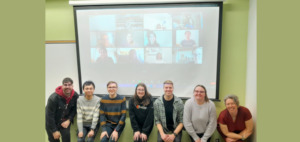Music Therapy Awareness Month
Posted on Thursday, March 16th, 2023
March is Music Therapy Awareness Month in Canada. Learn more about Algonquin College’s Therapeutic Recreation program and how music is incorporated into teaching and learning. Therapeutic Recreation learner Kristen Kelly shares some great information about music therapy and its benefits.
Algonquin College’s Therapeutic Recreation program and how music is incorporated into teaching and learning. Therapeutic Recreation learner Kristen Kelly shares some great information about music therapy and its benefits.
Understanding Music Therapy: Who’s a Perfect Fit?
If you’re feeling blue, why not listen to some music? It’s more than just a fun pastime — it’s a form of therapy.
What is music therapy? The concept of music therapy is when a trained music expert helps you feel better by using music in different ways, such as listening, singing or making music together. It’s been proven to help both the body and the mind. A career in music therapy is perfect for people who possess qualities like empathy, creativity, good communication skills and patience. Music therapists provide their services in various settings like homes, prisons, schools, youth centers and hospitals worldwide.
The Healing Power of Music: Exploring the Benefits
Music therapy provides an outlet for self-expression through music, allowing for non-musicians to unleash their creativity and engage in a fulfilling activity. Studies have shown that it can help people with dementia, reduce feelings of sadness and anxiety and help individuals overcome personal struggles. Hospitals have also incorporated music therapy into their treatments, resulting in improved motor function, mood and speech abilities in stroke patients.
Raising Awareness for Music Therapy Month
March is Music Therapy Awareness Month, a time to celebrate the remarkable benefits of music therapy and the certified music therapists who use it to help people of all ages and abilities. Certified music therapists are highly trained professionals who use music to connect with their clients and help them reach their goals. In Canada, certified music therapists complete a bachelor’s or master’s degree at a university approved by the Canadian Association for Music Therapists. Music therapy sessions can be conducted individually or in a group, depending on the client’s needs.
Here are some ways you can get involved in Music Therapy Awareness Month:
● Learn more about music therapy and its benefits by checking out resources from credible sources like the Music Therapy Association of Ontario (MTAO).
● Attend a music therapy session or workshop offered by a music therapist.
● Share your own music therapy story on social media or with friends and family if you or a loved one has benefited from music therapy.
● Donate to a music therapy organization that supports programs and research in this field.
Algonquin College offers a variety of programs to help students develop the skills and knowledge they need for successful careers. One such program is Therapeutic Recreation, which is designed to prepare students for roles in helping individuals with disabilities or chronic illnesses to lead fulfilling lives through recreational activities. As part of the program, students learn a variety of techniques that support individual well-being, such as art-based, music-based and nature-based interventions, to name a few.
The program offers a combination of classroom learning and practical experience through a full-time placement, where students can apply their knowledge in real-world settings. Students also have the opportunity to participate in research projects, community events and conferences to further their understanding of the field. Additionally, the program offers specialized courses such as Adapted Physical Activity, Therapeutic Recreation Assessment, Research, Evaluation and Documentation and Facilitation Techniques specifically applied to the field of Therapeutic Recreation.
Through its comprehensive curriculum and hands-on learning opportunities, the Therapeutic Recreation program at Algonquin College equips students with the skills and knowledge they need to make a positive impact in the lives of those they serve.
For more information visit the Therapeutic Recreation program page.
Learn more about programs like this at our upcoming Spring Open House on April 1, 2023
- Posted in
- Words
- Tags: